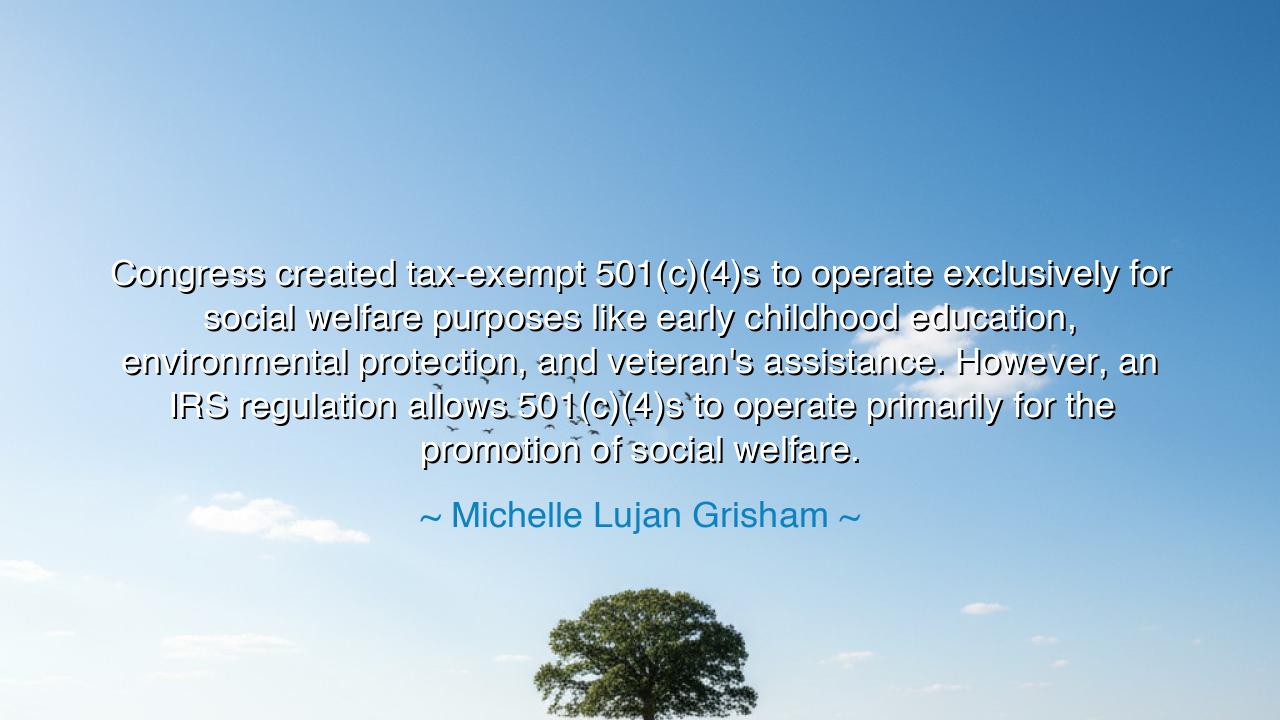
Congress created tax-exempt 501(c)(4)s to operate exclusively for
Congress created tax-exempt 501(c)(4)s to operate exclusively for social welfare purposes like early childhood education, environmental protection, and veteran's assistance. However, an IRS regulation allows 501(c)(4)s to operate primarily for the promotion of social welfare.






Hear, O seekers of truth and guardians of justice, the words of Michelle Lujan Grisham: “Congress created tax-exempt 501(c)(4)s to operate exclusively for social welfare purposes like early childhood education, environmental protection, and veteran's assistance. However, an IRS regulation allows 501(c)(4)s to operate primarily for the promotion of social welfare.” These words uncover a subtle yet profound shift: what was born of purity of purpose, devoted exclusively to the good of the people, has been reshaped by interpretation into something lesser, something diluted, where “primarily” is deemed enough. Within this change lies both danger and warning, for the loosening of language can weaken the very pillars of justice.
The ancients knew that words, once softened, can unbind oaths. A law inscribed in stone that says “always” is firm; but a law that says “most of the time” is fragile, vulnerable to manipulation. Congress intended these 501(c)(4) organizations to serve the people in their need—children learning to read, lands in need of protection, veterans who bore the burdens of war. Yet the alteration by regulation shifted the duty from an exclusive mandate of service to a primary emphasis, leaving room for influence, politics, and profit to creep in. Thus, what was to be a sanctuary for the people risks becoming a tool for factions.
Consider the story of the Roman Republic. The office of Tribune was created solely to defend the rights of the plebeians, to be their voice against the abuses of the elite. Yet over time, ambition and corruption seeped in. Tribunes who were meant to stand exclusively for the people began to serve “primarily” for their patrons or their parties. The power of the office was not lost in a single stroke, but in the slow erosion of its purpose. In this, we see reflected the very concern Lujan Grisham raises: the weakening of intent through softened duty.
The origin of her words lies in the ongoing debates about political influence in tax-exempt organizations. For in the present age, many 501(c)(4)s, once meant for social welfare, have been harnessed as vehicles for political campaigns, lobbying, and shadowy influence. Instead of nurturing children, protecting the earth, or aiding veterans, they sometimes become instruments of division. The shift from “exclusively” to “primarily” has allowed them to stray, still cloaked in the dignity of tax exemption, yet less bound to their noble beginnings.
The meaning of her teaching is not merely about law, but about vigilance. For every institution created for the common good must guard against the slow corrosion of its mission. When the standard is diluted, when the word of duty is softened, then justice itself begins to falter. Exclusivity of purpose is the guardian of integrity, while primacy alone leaves open the door to compromise and betrayal.
The lesson for future generations is this: cling to clarity in law and in life. Do not accept the language of half-measures when full devotion is required. If something is meant to serve the people, let it serve the people without dilution. Beware of loopholes, for they are the cracks through which corruption enters. What begins as a small shift in words may become a great shift in destiny.
Practical action lies before us: demand transparency from organizations that claim to serve the public good. Insist that their actions align with their missions. Support reforms that restore the original intent of social welfare laws, and hold accountable those who exploit vagueness for gain. In daily life, live by the spirit of exclusivity when it comes to your highest duties: serve with your whole heart, not merely part of it.
So let it be remembered: Congress gave the people a gift in the creation of 501(c)(4)s, meant to serve exclusively the common good. Let not that gift be twisted by the softening of words. For in the strength of our definitions lies the strength of our integrity, and in the unwavering devotion to purpose lies the salvation of our common life.






AAdministratorAdministrator
Welcome, honored guests. Please leave a comment, we will respond soon